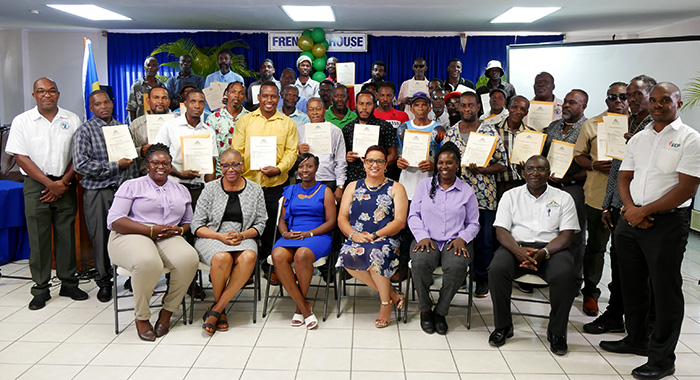Forty-one people have been certified in chainsaw operations in St. Vincent and the Grenadines as part of the April volcanic eruption recovery efforts.
The graduates received their certification on Wednesday in Kingstown during a graduation ceremony hosted by the ministries of economic planning, forestry and education.
The 75-hour training course ran from April to June and saw trainees engaged in practical sessions in various areas of the country.
The graduates comprised 13 forestry officers, five of whom are now assessors, and 28 trainees, including one female.
During the ceremony, Director of Forestry Fitzgerald Providence encouraged more females to be involved in using chainsaws, sentiments that were echoed by the Volcanic Eruption Emergency Project (VEEP) Project Coordinator Roxanne John, Director of the National Qualification Department, Endall Johnson and Permanent Secretary in the Ministry of Agriculture, Nerissa Gittens.
Johnson highlighted the importance of skilled workers, saying, “Academics are going out the door.”
He underscored the importance of skills, noting that the certification is portable across the region.
Johnson said the certification validates skills, increases marketability, enhances earning power, enhances performance, and improves reputation, respect and standards.
In her featured remarks, Gittens encouraged the graduates to cooperate, practice safety and continue to educate themselves.
She stressed the importance of graduates using their newly certified skills to assist with the rehabilitation left by Hurricane Beryl on July 1.
“The training you have should give you peace of mind when you go out to work,” she said.
Using the Prior Learning Assessment Recognition (PLAR) tool, 13 chainsaw operators were evaluated and assessed in the use, operation and maintenance of chainsaws with a focus on preparing, servicing and repairs of agriculture machinery and equipment, performing routine checks and inspection and servicing agricultural equipment and repairing agricultural machinery.
The officers involved in the training are known and established professionals in their field, with two to 33 years of experience.
It was established that these officers were fully competent and skilled as they had trained other individuals in the use of chainsaws but lacked official credentials.
The National Qualifications Department was identified for the certification process.
Twenty-eight people were certified in Level 2 National Vocational Qualification (NVQ) in chainsaw and repairs. The trainers divided the trainees into districts (Central, Windward and Leeward).
Training sessions were conducted on Mondays and Wednesdays from 10 a.m. to 2 p.m. and saw the teams traveling across the country for training.
Training of the Central team took place in the Montreal area, the Leeward group in the Cumberland Valley and Chateaubelair and the Windward group visited areas like South River, Sandy Bay, Orange Hill and Fancy.
The NQD identified and selected five of the 13 trainers to undergo assessor training in the agricultural sector. Officers were selected based on their expertise, years of experience using chainsaw and level of previous training and ability to complete the level 4 programme.
These officers completed their three-week programme in June.
Assessors will subsequently be certified at a Level 4 Caribbean Vocational Qualification in agriculture.
This certification programme was created as part of VEEP’s Component 2 — Restoration and “Building Back Better” of critical services and strengthening of emergency preparedness and response capacity”.







This sounds like a useful program. I would, however, caution those involved in offering the program and those like iWitness News who reported on the program to use language describing the program more carefully. For example, this article states: “Forty-one people have been certified in chainsaw operations in St. Vincent and the Grenadines” “The trainers divided the trainees into districts (Central, Windward and Leeward)” “Training sessions… saw the teams traveling across the country for training.” The 41 people trained were in St. Vincent (not the Grenadines). The Grenadines were not included in the districts the trainees were divided into. The teams did not travel across the country for training. They travelled across St. Vincent, yes, but they did not travel to the Grenadines. Some of us are truly weary of so-called national programs or services that do not touch the Grenadines, yet are prsented by government or others and described by media outlets as “national” or “St. Vincent and the Grenadines” or “all across the country.” Let’s be factual, please, and call a thing a thing. Or should the Grenadines just rejoin Grenada?